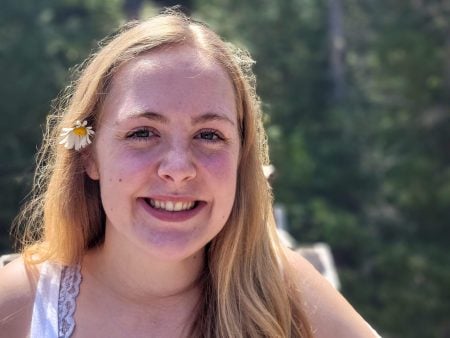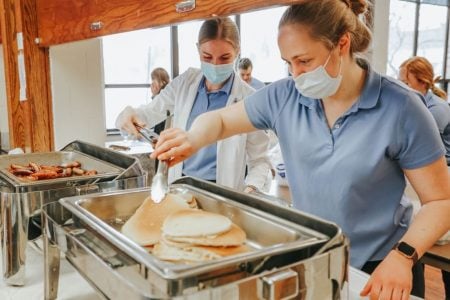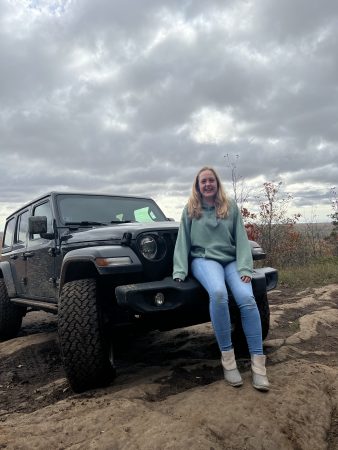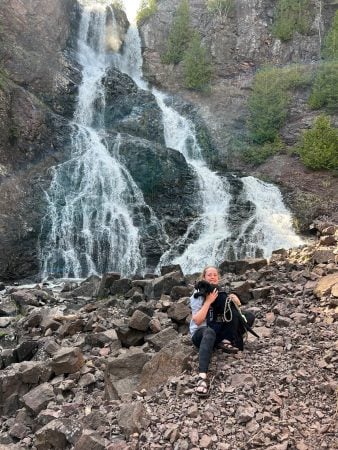Clinicals are a key component of any nursing program. students will spend as much as 180 hours in a healthcare setting like a hospital, urgent care, or long-term care facility, getting hands-on experience. We spoke with Allison Cooper, who talked about her clinical experience. She also discussed the benefits of academic families, a key way incoming nursing students are supported by their peers. Allison also offers advice to students interested in pursuing this degree.
Why did you choose to go into nursing? Was there a life experience you had?
My mother was a nurse before she got chronically sick with Chronic Fatigue Syndrome (CFS) when I was about two years old. Originally I thought I wanted to go into nursing because of her being a nurse. However, that was not the case. What drew me to nursing was my love for science but with a human twist. I remember always looking up CFS to learn more about something that still does not have a cure. I also was able to watch my own surgery and thought that it was the coolest thing ever to see my tendons and how they move.
I also love the direct patient contact nursing has to offer. Nurses are one of the biggest support persons for patients who are, sometimes, at the lowest part of their lives because of being sick. For me specifically, I wanted to be able to give back to the men and women in the military and work as a nurse within the military.
The concept of an academic family enhances the learning experience. How did your academic family help you in your first years in the program?
The first year of the nursing program can be difficult because of learning how to balance school, work, and social life. My academic family was not only a mentor but a massive support system when figuring this out. I was able to go to them with any questions I had about classes and how to time manage everything. They were also my family away from home, and I was able to do non-nursing activities and build lasting friendships with them!
In what way did the academic family concept help you as an upperclassman mentoring newer students?
I loved the academic family even more as an upperclassman. I actually found a passion for teaching, which is something I never saw myself doing. It was a great way to ease the sophomores’ nerves as they went through their first year in the program. It was also a great refresher for information as I began studying for the NCLEX!
Where did you complete the majority of your clinical hours?
We completed the majority of the clinical hours at the local hospitals- Portage and Aspirus. But, we had a lot of different experiences. We went to the local clinics. We went to Marquette for more specialty areas, such as psychiatric and neonatal intensive care nursing.
I had the opportunity to visit many settings. The majority of it was in the hospital setting between medical-surgical, emergency room, intensive care unit, surgery, and labor and delivery. But, I was able to go to Marquette for more critical care in their intensive care and emergency room. I also did a couple semesters with rotations in hospice, oncology, pediatrics clinic, and pediatric cardiology, and family practice clinics!
My favorite clinical experience was in the emergency room in Marquette. I was able to see a trauma in the ER which I always thought would be a setting I’d like. So, it was great to be able to be in the midst of it helping. It definitely solidified that as an area I could see myself in! I also really enjoyed labor and delivery because it was something that I didn’t think I’d have an interest in. But, with that rotation, I was able to see and do the nursing care for deliveries of newborns. That was when I realized that I also enjoyed that area of nursing as well.
What are some of the things you did during nursing clinicals? What did you enjoy the most about the experience?
Throughout my three years of clinical experience, I was able to practice many nursing skills, like IV inserts, inserting Foley catheters, and suctioning! I feel going through the clinical rotations, a student learns the fundamentals of nursing and how to be a nurse. I learned how to effectively communicate with patients therapeutically and how to put into practice the concepts we learned in the classroom. What I enjoyed the most about my clinical experience was being able to physically be in the different specialties. This helped me narrow down the things that I liked and did not like. I also really enjoyed being able to practice my skills in a real-life setting.
What did you learn about yourself from the clinical experience?
The clinical experience allowed my passion for nursing and compassion for people to really shine through. It made me realize nursing was the best choice I could have chosen for myself! In addition, I learned that I am able to persevere through challenges and problem-solve.
How do you think the clinical experience has set you up for success in your after-graduation plans?
The program has us go through a detailed clinical. We spent 180 hours a semester at sites and had paperwork to fill out for the rotations. I feel this prepared me very well for life after graduation because of all the in-person time I had in a setting where I would be working while practicing my skills. The paperwork, although sometimes tedious, was well worth it. As I filled it out, it made me think about diseases and how it affects a person. It made me feel comfortable and confident going into my career.
What advice do you have for students getting ready to go through clinical?
The biggest advice I have for students going through clinicals is to always ask questions and get involved in as much as possible. This is the only way you will get the most out of your experience and benefit your education. It was what I did, and I felt I got more out of the clinicals, enhanced my knowledge bank, and practiced skills I know I will need when I graduate.
Allison, what advice do you have for high schoolers who are considering getting a bachelor’s of science in nursing?
Deciding whether or not you want to pursue a BSN can be difficult. I feel shadowing nurses or becoming a certified nursing assistant can really help you decide if it would be a good fit. I did both of these, and it really showed me that I had a passion for nursing and solidified my choice. If that isn’t a doable option if you really enjoy science and anatomy and physiology, this could be a great fit, and I would suggest you give it a try! A BSN also gives you many leadership experiences! It allows you to go into management and other avenues that nursing has to offer other than bedside in hospitals!
NOTE: Allison Cooper received her BSN from Finlandia University in May of 2023. Finlandia University closed in June 2023. The Nursing program (including most faculty and staff) moved to Michigan Technological University shortly thereafter. Tech will incorporate many of the same components Allison mentions in the interview, including clinicals, academic families, coursework, and NCLEX prep. As of the date of this post, the Bachelor of Science in Nursing (BSN) degree is in the process of obtaining accreditation by the Commission on Collegiate Nursing Education (CCNE) and The Higher Learning Commission (HLC). The program has been approved by the Michigan State Board of Nursing. Check back this fall for more detailed information on this exciting new program coming to Michigan Tech.



